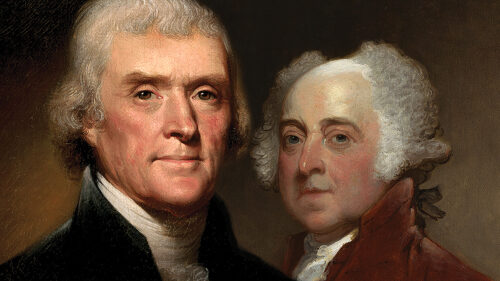
From Bullets to Ballots: The Election of 1800 - Ch. 9
Conclusion — The Revolution of 1800 and Party Government
The Federalist party having publicly considered “usurpation” in 1801 made Federalist leaders deeply suspect to many of the very people who had recently voted for them. So in the end the party’s threat to ignore the country’s choice of Jefferson to be president helped to underpin the Republican victory. Two days after the end of the presidential balloting by the House of Representatives in February 1801, Jefferson sent his son-in-law a summary of the Federalists’ actions during that stressful week of balloting. He knew that the Federalist leaders, in spite of having backed down, were not at all reconciled to him being president. The way they had arranged the voting in that last ballot, with no Federalist obliged to soil his hands by voting for him, had to be “considered as a declaration of perpetual war.” But, he gloated, “their conduct has completely left them without support,” because throughout the country it had alienated Federalist voters from Federalist leaders. The Federalists’ threat of usurpation had made even people who voted against the Republicans come out in their favor, so that Jefferson’s victory, “when obtained came as a thing of their own wishes.” In short, the Federalist leaders’ conduct “has done in one week what very probably could hardly have been effected by years of mild and impartial administration.”
Given the Federalists’ view of the principles at stake, their provocative maneuvers between December 1800 and February 1801 were understandable, even though this final challenge to the election of Jefferson risked making the partisan conflict end violently rather than peacefully. Ironically, the peaceful resolution of this great clash between the two parties helped to establish the precedent for the peaceful transfer of power. The necessity of overcoming the last barrier to the establishment of this new and peaceful kind of revolution added to the power and the momentum of its establishment when it finally happened. In fact, this is true of all of the barriers that had to be surmounted on the way to the establishment of the use of ballots instead of bullets in revolutions of political principles. Washington’s quasi-monarchical presence up to 1797, the foreign policy crises with Britain and France from 1793 to 1800, the aggressive domestic initiatives of the Federalists in 1798, and the brief but threatening stand that Federalists made in their “usurping” maneuvers in 1801: all of these had been barriers to the Republicans’ efforts to influence federal government policies. They all had the effect of impeding the electoral campaigns and delaying the electoral successes of the Republicans, and of making partisan divisions much more acrimonious. But not only did they serve to give the Republicans good reasons and occasions to perfect their organization, techniques, and persuasion; more importantly, they also made the precedent of the peaceful revolution of principles more visible, and therefore more of a durable precedent. If Madison and Jefferson had been able to rid the federal government of Hamiltonian influence with less fuss, more quickly and more quietly, as they had first hoped when they set off to do this back in 1791, the precedent might have been little noted and hardly remembered.
For the purpose of establishing this precedent, perhaps it was equally fortunate (although also sad) that some Federalists abandoned their initial respectable defense of American republicanism (maybe too snobbishly elitist, but they were not alone in that) and began toying with a much less defensible and less appealing skepticism about universal political principles. From 1793 onwards, Federalists had invariably accused Republicans of too closely identifying American republicanism with French republicanism. Yet in the end it was a small number of Federalists who actually collapsed the differences between American and French republicanism, when, in their reaction to the offensive French diplomacy of 1798, they began to reconsider and to adopt Edmund Burke’s view that good government must be based not on any abstract, universal principles (such as the universal truth that “all men are created equal”), but on “the combined wisdom of the ages.” This turn in Federalist thinking implied that if French republicanism was intrinsically evil, then perhaps American republicanism, if it too was understood as being based on universal principles, was also very questionable. These Burkean Federalists began to see the American Declaration of Independence more as a product of the “cruel necessity” of “self-preservation,” than as an inspiration for freedom everywhere. This late, pessimistic Federalism was completely at odds with Jefferson’s consistent belief that the Declaration was (as his last extant letter would describe it in 1826) “the signal arousing men to burst the chains under which monkish ignorance and superstition had persuaded them to bind themselves.”
For the sake of establishing the precedent of peaceful principled revolutions, it was, finally, fortunate that the Federalist party was defeated so comprehensively in the end. (Even the close presidential race of 1800, on examination, shows that Republican electoral strength was understated by the electoral college vote, particularly in New Jersey and Pennsylvania.) If Federalists had proved to be less self-destructive, more confident, and more popular at the end of the decade, and if they had not been defeated so soundly in 1800, and even more so in 1802 and 1804, then the Republicans would have found it much more difficult to be magnanimous in victory. A less decisive electoral battle in 1800 (for example, less convincing majorities or divided control of congress), or a resurgence of Federalist strength in 1802 or 1804, might well have prolonged the intense party conflict, and could well have ended in the disunion or civil war that many competent observers had been fearing—and a few of them even beginning to favor—as the outcome of the country’s increasingly enraged partisan divisions. So while it was good that the conflict had memorable depth and duration, it was also good that it stopped when it did. As Jefferson immediately appreciated, it was also good that the Federalists had engaged in some very public eleventh-hour partisan skulduggery in 1801, because this immensely magnified the effect of the Republicans’ electoral victory by making so many recent supporters of Federalism into Republican sympathizers.
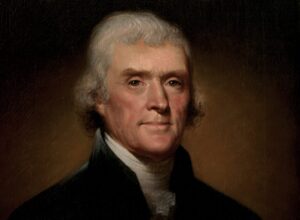
As president, Jefferson immediately exploited this opening, and energetically pursued a strategy that tried to turn everyone except “incurable” Federalist leaders into Republicans. This strategy began with his First Inaugural Address, which seemed (but only seemed) to promise what he had referred to in his recent letter to his son in law as “years of mild and impartial administration.” Jefferson’s Address disparaged “political intolerance,” which could be “capable of as bitter and bloody persecutions” as religious intolerance. He blamed “the throes and convulsions” of the old world for having divided Americans’ opinions on how best to maintain American security. “But,” he continued, ” every difference of opinion is not a difference of principle.” In fact, he now noted, “We have called by different names brethren of the same principle. We are all republicans—we are all federalists.”
Remarkably, Jefferson’s Inaugural Address was his first truly public statement in the partisan conflict of the decade. His earlier ones had been leaked letters, or, in the case of the Kentucky Resolutions, impenetrably anonymous. Astonishingly, Jefferson’s Address seemed to be promising a non-partisan and nonrevolutionary administration. Federalist leaders expressed relief that Jefferson would not after all do what he and his party had seemed to be threatening (thank goodness he was a “contemptible hypocrite”!): he would be not vindictive, but conciliatory and tolerant towards Federalists; moreover, they (wrongly) concluded, he would not undo the essentials of Federalist legislation. In particular, Federalists noticed that Jefferson’s Address had announced among “the essential principles of our government, and consequently those which ought to shape its administration,” no “entangling alliances” (so Washington’s and Adams’ neutrality policy was safe), and “sacred preservation of public faith” (so no repudiation of the national debt, even though it had been greatly enlarged by Hamilton’s policies).
But the Federalist leaders who expressed relief at these statements were misled by the tone of Jefferson’s Address, and paid too little attention to its evident (and soon more obvious) meaning. In private letters in 1801 and 1802, as well as in his statements in letters to Republicans or potential Republicans (including Washington) while campaigning against the Federalists from 1792 through 1800, he made it clear that he was interested only in reclaiming the lost sheep, not in working with the errant and ineducable shepherds of Federalism who had led these parts of the flock astray. He did not intend to conciliate or to cooperate with the Federalist party, to compromise with its principles or its leaders, or even to tolerate its partisan opinions and principles as anything but (as he stated in the Address itself) individual examples of “error of opinion,” unable to counteract the effects of reason on the vast majority of Americans. People with these erroneous political opinions could be left as isolated “monuments” to the kind of tolerance that rational parents show to their erring children. Even this patronizing tolerance did not apply to the Federalist party as a political force, which was one of those unfortunate “moments of error” in devotion to “the creed of our political faith,” from which we must always “hasten to retrace our steps” in order to return to the true principles of government. More bluntly expressed (in a private letter to a fellow Republican leader in 1802): Jefferson and his party’s re-establishment of the true principles of republicanism was intended to sink Federalism “into an abyss from which there shall be no resurrection for it.” Saying this publicly in 1801 might have endangered the Republican congressional and presidential majorities in 1802 and 1804.
So Jefferson’s gracefully beguiling line “We are all republicans—we are all federalists” (which echoes statements made by him as early as December 1792) really meant what Jefferson and other Republican leaders had been saying throughout the decade of partisanship: contrary to what Federalist leaders have said, we Republicans are not Anti-federalists, we are and always have been the truest friends of the Constitution; furthermore, the mass of those who have misguidedly supported Federalism (but when awakened to what Federalist leaders have been doing will more and more come to support us), have good republican principles, unlike those who have been their leaders. Just as Madison in his partisan press articles at the launch of the first partisan campaign at the beginning of the decade had emphasized the need to consolidate American public opinion, Jefferson now called for American citizens to “unite with one heart and one mind,” to “restore to social intercourse that harmony and affection without which liberty and even life itself are but dreary things.”
The Success of Jefferson’s Strategy
Early confirmation of the success of Jefferson’s strategy of consolidating into the Republican party all but a few incurable Federalists was the increase in the Republican majorities in congress to over 70% in the 1802 elections (no hint of a mid-term anti-presidential trend), and to over 80% in 1804. The Republicans also received over 90% of the electoral college votes in 1804 (in contrast to just 54% in 1800). In his Second Inaugural Address in 1805, Jefferson celebrated this as a manifestation of a growing “union of sentiment,” and looked forward to the completion of an “entire union of opinion.” Within fifteen years of Jefferson first taking office, the Federalist party disappeared from American politics. In 1825, John Quincy Adams, the son of the last Federalist president, was elected president as a “Republican” (albeit a “National” Republican, with policies that proved to be too suspiciously Federalist to be accepted by congress, and which therefore helped ignite the second American party system).
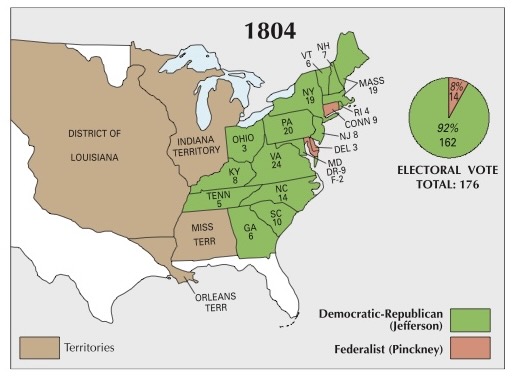
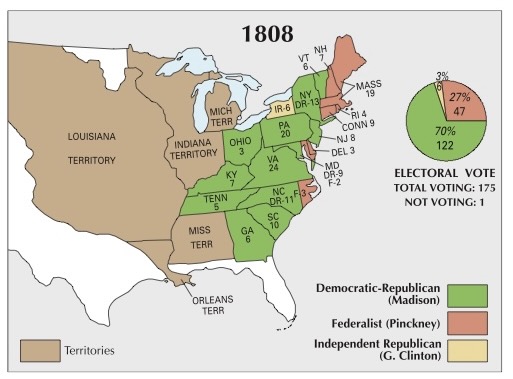
As for Jefferson’s approach to Federalist policies, here too the Federalist leaders’ expressions of relief on hearing or reading Jefferson’s First Inaugural Address were mistaken. Yes, Republicans had learned (Jefferson earlier than many others) that the best American foreign policy at present was one with “no entangling alliances.” But while this meant discarding illusions about the French republican experiment and the possibility of using a French trade agreement as an alternative to trade with Britain, it also meant not hesitating to try the weapon of a trade embargo with Britain as well as with France when American commerce was again attacked by these warring European powers during Jefferson’s second administration. In domestic policy, while Republicans did not close the national bank, they did reverse the Federalists’ policy of guiding and stabilizing the financial system through the national bank’s control of the state banks. Moreover, Jefferson’s inaugural promise about “the sacred preservation of public faith” meant steadily paying off the national debt, not the Federalist policy of extending and perpetuating it. Jefferson and his Secretary of the Treasury Albert Gallatin reduced federal government spending (mainly the diplomatic service, the army, and the navy) by twenty percent. Coupling this economizing with sales of public lands and increases in revenues from import tariffs enabled them to reduce the debt even though they eliminated direct taxes (e.g. the much-hated whisky and land taxes). At the same time, they kept import tariff rates low, so domestic manufactures were not encouraged by federal policy, as Hamilton had wanted them to be. As Jefferson’s Inaugural Address had announced, government policy was to be the encouragement not of manufactures but “of agriculture, and of commerce as its handmaid.”
Jefferson’s policies and his strategy of making Federalists politically impotent were implemented by means of his party’s control of congress, and by his appointment of Republicans as executive branch officials and as federal judges. By getting congress to reduce the number of federal judges, he even managed to retire some existing Federalist judicial appointees.
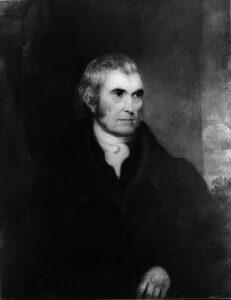
However, Jefferson was unable to remove Federalist appointed judges without abolishing their jobs (although he did nearly succeed in getting one removed by impeachment), so many Federalist judges remained in place. Especially important was the fact that John Marshall, appointed by John Adams as Chief Justice of the Supreme Court in 1801, remained in that position until 1835. From this position, Marshall led the federal judiciary to uphold the constitutional doctrine of implied powers (which Federalists had championed against Republicans ever since the battle over the national bank in 1791), and to establish the legal right of the federal government to regulate economic affairs, and to structure and to stabilize American economic development in a Hamiltonian manner. So the voice of Federalism was not completely excluded from the dialogue of American politics.
Although Jefferson would not have agreed, we can see that the Federalists’ having this opportunity to retreat to and to regroup in the judiciary was fortunate, for two reasons. In the first place, the enemy’s having somewhere to retreat to, even though it was to the least political branch of government, made it easier for them to be reconciled to the overwhelming Republican political dominance, and therefore easier for the principle of peaceful principled revolutions to be established. In the second place, having an alternative voice in the politically subordinate but dignified position of the federal judiciary benefited the course of American political history by maintaining an alternative way of thinking about constitutional and policy questions.
Jefferson himself occasionally speculated (privately, as in his letter to John Taylor in June 1798, quoted above) that in a free society a principled party division might be useful, if only “to induce each to watch and delate to the people the proceedings of the other.” However, as we have seen, in Jefferson’s practice (and most of the time in his theorizing), the strategic aim was to turn incurable Federalists into quaint, eccentric monuments to free speech, not to set them up, in the judiciary or anywhere else, as minority censors of the Republicans in power. Jefferson saw that partisanship is justified whenever republican principles are threatened, and that successful republican partisanship must have recourse to an ideology, a “creed” of “political faith.” He believed furthermore that the public aim of principled partisanship must be to make this creed so politically dominant that there is an “entire union of opinion, which gives to a nation the blessing of harmony, and the benefit of all its strength.”
Ideology and Party Government
The word “ideology” (like “terrorism”) was coined in France in the 1790s. From its first meaning, the science of ideas, it quickly passed to its more political meaning, the use of systems of ideas to advance political causes. The use of the word in this sense usually implies that the system of ideas is being expounded dogmatically by political visionaries, and always implies that it is being used for partisan propaganda rather than for purely theoretical purposes. Those American founders such as Washington and Adams who were determinedly above partisanship in the 1790s deeply distrusted the ideological nature of the Republican party. Surely Washington and Adams were not wholly wrong in this distrust. The establishment of the respectability of republican partisanship, which made possible the establishment of the principle of peaceful revolutions of political principles, entailed losses as well as gains. Party government has vices as well as virtues.
At the outset of this enquiry, we noted that, although political parties in modern democracies have and need principles, it is important that the principles that democratic parties contend for must not be the persecuting principles that revealed religions have been prone to inject into political conflicts. So religious ideologies must, insofar as possible, be excluded from democratic politics. We also noted the destructiveness of fanatical atheist partisanship in democratic politics. But to ask that secular ideological principles be altogether excluded from partisan contention in modern democracies would be asking too much. Even though political ideologies often oversimplify political reality and distort political judgment, they are the necessary tools of party warfare and morale. In constitutional democracy and modern party government, these ideologies therefore necessarily come to constrain and eventually to make impossible the wholly nonpartisan statesmanship admired and practiced by men like Washington and Adams.
To understand the role of principles and ideologies in modern political partisanship, and its implications for statesmanship, we must distinguish among three different kinds of principle: religious, democratic, and partisan. The first kindalong with its counterpart, fanatical atheism must be avoided by partisans if there is to be much prospect for representative government, in which popular elections decide between parties. The second kind—the basics of constitutional democracy—must be agreed upon by the parties: there must be widespread agreement on and willingness to fight for the preference of justice over injustice, freedom over slavery, government by the consent of the governed over despotism, the subordination of military to civilian authority, and other institutions and practices of constitutional democracy. There is a third kind of principle, distinct from the second, but which partisans (for example, Jefferson in his First Inaugural Address), for partisan purposes, will naturally try to fuse with the second. Only this third kind of principle is the proper object of partisan contention in a constitutional democracy. These partisan contentions can involve passionate ideological differences, but these will be differences not about the universal truth of constitutional democratic principles, but about the meaning and requirements of these principles in their application to varying circumstances. So this third, permissibly partisan kind of principle will normally include programs of action or policies, based on an interpretation of what democratic principles demand in the current circumstances, and therefore on opinions about what this particular democracy, here and now, should do.
Jefferson asserted that the Revolution of 1800 meant that it could no longer be said that “there is nothing new under the sun.” The partisan storm and its peaceful end showed (as he stated in his First Inaugural Address) that popular elections can be “a mild and safe corrective of abuses which are lopped by the sword of the revolution where peaceable remedies are unprovided.” Electoral revolutions in democracies can be revolutions without swords, if they are about differences of partisan principles (however ideological), but not if they really are disputes about the superiority of the principles of democracy themselves. Parties’ disagreements about the application of democratic principles can seem tantamount to disagreements about the truth of the principles themselves, but the distinction is crucial for the displacement of bullets by ballots. Good democratic citizens and politicians will at some level firmly grasp this distinction even when their partisan rhetoric misleadingly suggests—perhaps even to themselves—that the indisputable basic democratic principles are at stake.
Federalists and Republicans really had no disagreements of the second kind, about the superiority of representative democracy (although in the end a few Federalists did flirt with abandoning their sound understanding of the principles of democracy as these had been set out in the Declaration of Independence). But they did have disagreements of the third kind, in their programmatic policy disputes about the direction of economic development and about the role of government in superintending that development. And there was a great lack of clarity on the distinction between these two kinds of principle in the 1790s, because there was no precedent for this distinction, just as there was no precedent for the more peaceful kind of revolution that this distinction made possible. This lack of clarity and precedent, as well as the natural partisan tendency to hyperbole and misrepresentation, made both parties in the 1790s exaggerate the depth of their differences, by making them mistake their conflicts about programmatic principles for conflicts about the superiority of representative democracy (which they usually called “republican government”).
Can we reasonably expect this distinction between these two kinds of principle to control the conflicts between democratic parties, and to ensure that they will resolve their differences by peaceful ballots rather than by bullets? In the subsequent history of American political parties, even with the advantage of the precedent of the Revolution of 1800, American political partisans have often found the distinction between democratic principles and party principles both inherently difficult and instrumentally disadvantageous to maintain. We can see this in the revival of strong party conflicts in the second American party system. In the 1820s and 1830s, policy disputes arose between the National Republicans (subsequently merged into the new American “Whig” party) and the “Democratic” party, with the former favoring and the latter opposing neo-Hamiltonian financial and commercial schemes. Although their disputes never reached the bitterness and intensity of the parties of the 1790s, in their partisan rhetoric they did accuse each other of faithlessness to the fundamental principles of American democracy.
The intensity of conflicts in this second party system, in contrast to those of the 1790s, fell far short of civil war. In the second party system, party leaders could be far less doubtful than the first partisans had been about the desirability of publicly respectable parties as a permanent feature of the American regime, because they saw that their partisan conflict, notwithstanding its seriousness and in spite of its rhetorical excesses, was about differing policy principles rather than differences that could be resolved only by civil war. They had learned from the Revolution of 1800 that fair and open contests between two large parties with honest differences about the principles on which the government should be administered could be peacefully fought and won. They added to this lesson of the Revolution of 1800 a firm belief that the open and long-term acceptance of such moderately-principled partisanship was far better than repressing such honest and natural disagreements, since the pretence that there could be total political unanimity would only obscure these inevitable disagreements, which would then manifest themselves in vicious factions and personality contests.
When the American Civil War came (1861) it was because a politically significant number of Americans, and not just in the south, had been denying or distorting the self-evident truths of the Declaration of Independence. The turn away from ballots to bullets in 1861, ignoring Abraham Lincoln’s eloquent pleas, was based on deep disagreement not just about the best policies in the circumstances, but about the most fundamental principles of democracy. In this way, the Civil War confirms the lesson of the Revolution of 1800, that the resolution of partisan conflicts by ballots requires the partisans’ agreement on those fundamental principles, even though their spirited and indignant rhetoric will often naturally deny that this agreement exists. If that agreement is ever endangered, it is the duty of democratic statesmen to restore it.
Democratic Citizens and Statesmen
We have noticed that the necessary role for ideological partisanship in constitutional democracy diminishes the scope for prudential discretion traditionally allowed to statesmanship, to the disappointment of anti-partisan statesmen like Washington and Adams. But prudent statesmen in constitutional democracies will recognize, as Jefferson and his Republican co-partisans recognized, that ideological partisanship also opens up the possibility of making the public more alert, and more immediately involved in determining the direction of public policy. They will also see that the role of partisan ideology in modern democracies does not eliminate the need for statesmanship and prudent judgment. It simply means that democratic statesmen have to learn to work with the weapon of ideological partisanship in responsible ways that promote the competence of citizens and the common good.
Thus the demands on statesmen in party democracies are in fact very high. Principled partisan statesmen must use the weapon of ideological partisanship well, and they must forbear deploying this weapon (which, as we have seen, is not a smart device that causes no collateral damage) when it is neither necessary nor desirable. They have the heavy responsibility of ensuring insofar as possible that the ideological battles of popular referenda in important electoral watersheds like the Revolution of 1800 disrupt politics as usual only when it is right to do so. They must also judge how best to encourage wisdom in such important popular choices, for in the end, there is no getting away from the fact that triumphant partisan views on how to apply democratic principles in the given circumstances must be wise views if the country is to prosper. They must act and speak in ways that cultivate rather than undermine citizens’ sense of justice, so all parties, especially the majority party, will agree on the principles of democracy—the principles of majority rule and minority rights. They will remember that only this agreement on democratic principles makes it possible for principled partisan conflicts to be resolved peacefully by elections.
In spite of the ideological nature of partisanship, modern democracy is greatly enhanced by political parties. When they work well, parties cultivate and demonstrate popular approval of wise leaders and policies and disapproval of unwise leaders and policies. However, it is not inevitable that parties will work well. The development and acceptance of political parties in modern democracies increases rather than diminishes the need both for competent citizens and for wise statesmen.
